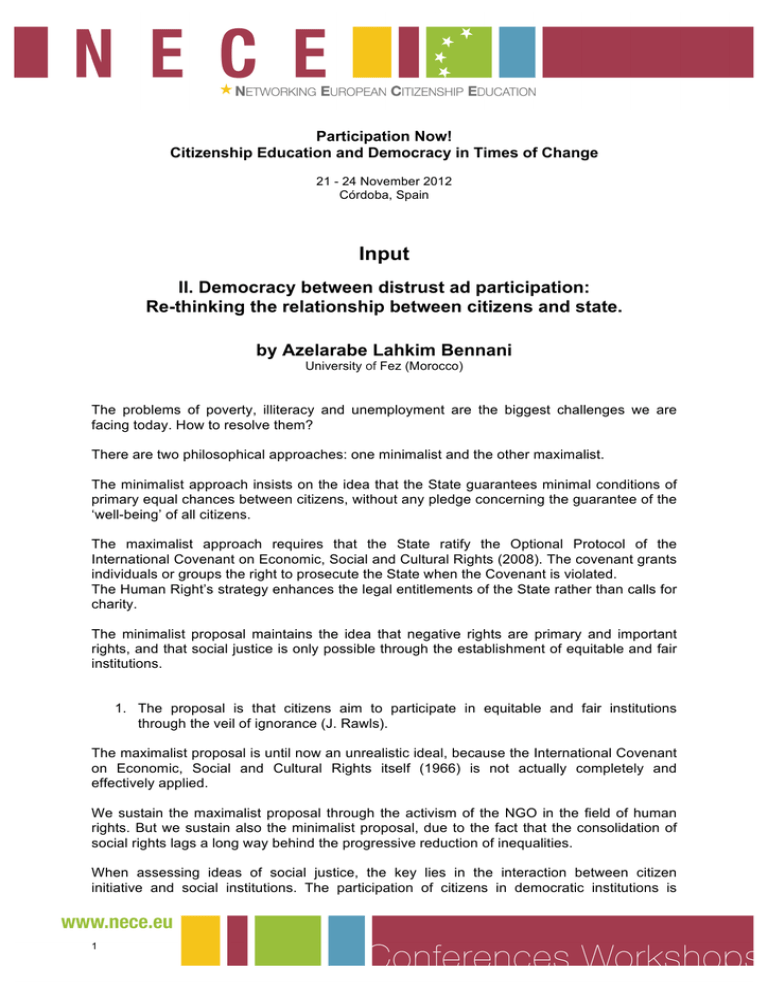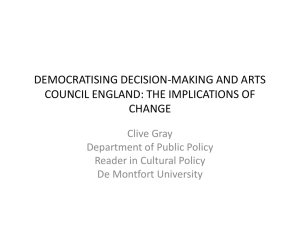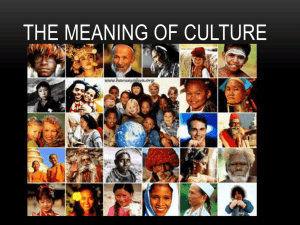Input
advertisement

Participation Now! Citizenship Education and Democracy in Times of Change 21 - 24 November 2012 Córdoba, Spain Input II. Democracy between distrust ad participation: Re-thinking the relationship between citizens and state. by Azelarabe Lahkim Bennani University of Fez (Morocco) The problems of poverty, illiteracy and unemployment are the biggest challenges we are facing today. How to resolve them? There are two philosophical approaches: one minimalist and the other maximalist. The minimalist approach insists on the idea that the State guarantees minimal conditions of primary equal chances between citizens, without any pledge concerning the guarantee of the ‘well-being’ of all citizens. The maximalist approach requires that the State ratify the Optional Protocol of the International Covenant on Economic, Social and Cultural Rights (2008). The covenant grants individuals or groups the right to prosecute the State when the Covenant is violated. The Human Right’s strategy enhances the legal entitlements of the State rather than calls for charity. The minimalist proposal maintains the idea that negative rights are primary and important rights, and that social justice is only possible through the establishment of equitable and fair institutions. 1. The proposal is that citizens aim to participate in equitable and fair institutions through the veil of ignorance (J. Rawls). The maximalist proposal is until now an unrealistic ideal, because the International Covenant on Economic, Social and Cultural Rights itself (1966) is not actually completely and effectively applied. We sustain the maximalist proposal through the activism of the NGO in the field of human rights. But we sustain also the minimalist proposal, due to the fact that the consolidation of social rights lags a long way behind the progressive reduction of inequalities. When assessing ideas of social justice, the key lies in the interaction between citizen initiative and social institutions. The participation of citizens in democratic institutions is 1 possible through: 2. The existence of concrete institutions of liberty and mutual recognition that permits the enjoyment of freedom (Hegel). Equitability is not reduced to the availability of negative rights. The citizen must have the chance of participating in the social institutions. The struggle for human rights is not conducted from a transcendental moral level disconnected to the reality, but from within the social institutions themselves. The limited success of representative democracy in the Arabic Word lies in its formal character. The form it takes as procedural democracy has led to a focus on the political and civic rights, at the expense of the social rights. The gap between negative and positive rights has lead to the alienation of the citizen and to the progressive refusal of the establishment. Rejection of the establishment in many Arabic countries is due to the corruption of the ruling State and to the escalation of poverty and social inequities. We arrive to the peculiarity of the traditional self-organization in the Arabic world: 3. Customs of solidarity are evident in many social ties within the community (Ch. Taylor). Arab Spring on behalf of social equity. Has the Arabic Spring an effect on the aimed social equity? The movement of the Arab Spring was a yearning for freedom and social equity, based on the principle of solidarity and old moral traditional practices. The Arab Spring was not homogenous. Protestations were split between minimalist and maximalist claims. But citizens share so many traditional social ties that they get together, regardless of all these differences. We designate the first proposal borrowed from Rawls as Kantian, the second as Hegelianism. The third is commonly referred to as ‘communitarism’ by Ch. Taylor, as an instance of forms of lives or ‘Lebensform’ by Wittgenstein, as Conventional Moral by K. O. Apel, as ethos, habitus by Aristotle or as Sittlichkeit by Hegel. Social activists prefer to participate more in the NGO, i.e. development and human rights associations, than in the political parties, because the social initiative is close to the population and to their concrete needs. Intellectuals adopt mainly a transcendental Ethics separated from the social sphere and alienated from their social ties, and uphold Ethics in its deontological definition by Kant. On the contrary, the involvement of the social activist in the traditional morals of solidarity rejects ethical formalism and focuses on socially enhanced moral requirements. Socials movements throughout the Arab Spring have taken different forms due to respective local customs. (The uprising of the veiled women in Yemen) My proposal is that local customs will be a decisive factor leading to a more successful participation in the reduction of inequities. Taking into account traditions of mutual help that prevail in tribes, villages, and the struggle for the human rights will be more effective. 2 Local customs are evaluated as a factor of social cohesion, and don’t in principle contradict the prerogatives of individual initiative and freedom. Advantages: 1. Participative democracy stems from local customs that is from existing institutions. 2. The different members of the community, in adopting the respective local customs, fit together well and form a united whole. 3. The adoption of customs as ways of social participation is by no means an alternative to the ruling positive law. 4. Citizenship education aims to use the ties of neighbourhood, family, friendship, marriage, and hospitality as bases for recognition and satisfying mutual needs. 5. These social ties explain why the NGO in developments and human rights organizations are more effective than political associations. 6. Education of the citizens starts from traditions of solidarity, on the way from local to “positive” universal human rights. We then start from the minimalist position, benefit from the advantages of local customs, and render necessary the question of the harmonization of local, national customs with the international ones. Participative democracy doesn’t marginalize representative democracy, once freed from its procedural narrow sense. Representative democracy will benefit from the advantages of participative democracy, and not the other way. While representative democracy draws its legitimacy through the validity of procedures, participative democracy is legitimate through the direct intervention in the improvement of the social lives of citizens. 3





